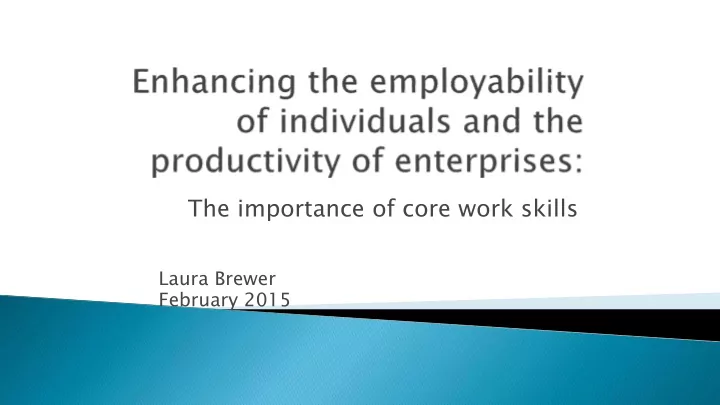

The importance of core work skills Laura Brewer February 2015
… the skills, knowledge and competencies that enhance a worker’s ability to secure and retain a job, progress at work and cope with change, secure another job if he/she so wishes or has been laid off and enter more easily into the labour market at different periods of the life cycle. Individuals are most employable when they have broad-based education and training, basic and portable high-level skills, including teamwork, problem solving, information and communications technology (ICT) and communication and language skills. This combination of skills enables them to adapt to changes in the world of work.
Youth unemployment rate over 22% Yet employers can’t find the skilled workers they need Large regional and rural/urban disparities in skills Extending the number of years of compulsory education not sufficient Reform of national VET system needs to focus on full range of skills needed for the world of work and extend outreach to the informal economy
Skills s for the world of work At their most elemental, foundation skills include the literacy and numeracy skills necessary for getting work that can pay enough to meet daily needs. These skills Basic/fo /founda dati tion on are also a prerequisite for continuing in education and training, and for acquiring transferable and technical and vocational skills that enhance the prospect of getting good jobs Specialized skills, knowledge or know-how needed to Vocation onal or perform specific duties or tasks technical Individual attributes that impact on work habits such as Professio fessional/ honesty, integrity, work ethic perso sonal The ability to learn and adapt; read, write and compute competently; listen and communicate effectively; think creatively; solve problems independently; manage Core work skills oneself at work; interact with co-workers; work in teams or groups; handle basic technology, lead effectively as well as follow supervision.
Learning ning to learn rn covers the knowledge, skills, attitudes and aptitudes which enable individuals to set, plan and reach their own learning goals and become independent autonomous learners. These skills equip young people for lifelong learning. Communi municat cation ion covers the abilities to gain understanding from others – by listening, reading and observation, using both formal and informal, oral and written means – and to to put across ideas clearly and effectively. Teamwork work covers the abilities necessary to operate smoothly and efficiently within a group, including those related to both cooperation and leadership. Problem lem-sol solvi ving ng covers the analytical skills required to evaluate information or situations and decide on the most appropriate ways of addressing problems. These skills include awareness of long-term consequences of actions taken and the capacity to assess and adapt plans of action.
For the individu dual al, they improve the ability to get and keep a job, to move around in the labour market and to engage in lifelong learning. For the emp mployer er, these core skills mean employees better able to respond more readily to changes in the workplace Worker ers learn faster and perform more effectively, allowing enterprises to develop innovative and flexible workplaces, where employees can offer novel ideas, and readily adjust to technological change and organizational restructuring.
st job and move on in the labour market, Securing curing the e first 1. 1. require core work skills as well as the technical skills to perform specific tasks. Improve prove access cess to innovative, good-quality secondary 2. 2. education and training, where these skills are best acquired. Opening up opportunities to acquire core employability 3. skills to the disadv advan antaged, aged, including those who have dropped out of school or never attended, and those who are working in the informal economy under poor conditions. Obtaining reco cogn gnitio ition of the core employability skills 4. acquired outside the workplace. These skills are not typically certified, so how are they to become recognized?
Quality apprenticeship system 1. Improve quality and access to primary 2. education Sectoral VET reforms (more enterprise 3. engagement) Strengthen PES (the bridge between skills 4. supply and demand) on recogn gnit ition ion of the core employability skills Revitalizing I-YEN 5.
Laura Brewer Deputy Director/Skills and Employability Specialist International Labour Organization CO Manila
Recommend
More recommend